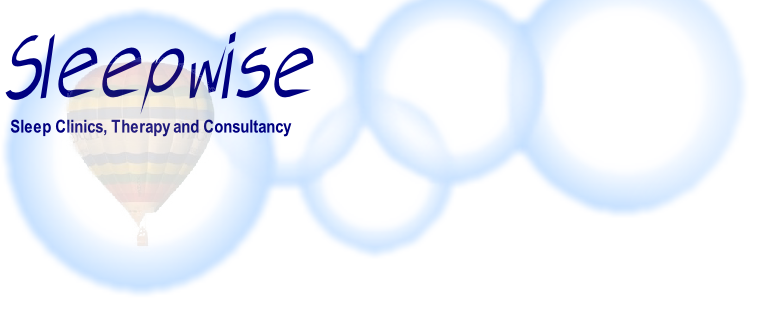

Sleepwise Sleep Clinics and Therapy
Sleepwise provides professional sleep therapy services and advice, including clinics, one-

Sleep & Stress
Consultants
since
1999




Sleepwise Sleep Clinics and Therapy
Sleepwise provides professional sleep therapy services and advice, including clinics, one-


The Sleep Deprivation Test
Personal Version
Sections 1 and 2 of this test have been devised to help potential Sleepwise clients become aware if they are suffering from the effects of sleep deprivation or ‘sleep debt’. It is not intended to identify medical issues, however it is possible that the underlying cause of the sleep deprivation could be medical and thus results indicating such should be discussed with their doctor. Sections 3, 4 and 5 add detail to your sleep problems and habits, and reflect what the Sleep Therapist will ask you at your initial session.
No data is recorded whilst using this test. Please be honest with yourself. Sleep deprivation can cause potentially serious health, safety and workplace performance issues. If at the end of this test you have concerns about your sleep, we do encourage you to contact a Sleep Therapist, or your doctor, to discuss how your could improve the quality and effectiveness of your sleep.
We suggest that you only consider the last 30 days when answering the questions. You can consider a longer period if you wish, however this test was designed to only consider the past 30 days to avoid exaggerating results, and as a comparison tool against a standard data set.
The results would normally be assessed by a Sleep Therapist, so as you are self assessing yourself, if you have ticked any Red questions, you should consider these to be serious enough to discuss your sleep with a Sleep Therapist or your doctor. Amber questions could indicate lifestyle issues that need to be addressed, or can be easily explained e.g. falling asleep during a very boring training session or TV programme.
Copyright © Sleepwise.co.uk 2015 -
Sleep Deprivation Test
Section 1 -
Micro sleeps can be very dangerous. The most common noticeable occurrence is when driving in an exhausted or sleep deprived state, however they can occur at almost any time if suffering from sleep deprivation.
I experience one or two second blackouts or loss of awareness (micro sleeps):
1. Never or Very Rarely
2. Sometimes (for example; evenings and only when very tired after a long hard working day)
3. Occasionally (for example; during the day maybe two or three times in the last month)
4. Frequently (for example; during the day one or twice a week)
5. Very Often (for example; more often than above)
If you have answered 3. 4. or 5., how do they occur? -
Every day around the same time
Unexpectedly without warning
Repeatedly one after the other within seconds or minutes of each other
Uncontrollable and persistent (for example; even after drinking a strong coffee or energy drink)
Often lasting longer than 2 seconds
Section 2 -
When suffering sleep deprivation, normal functions, especially decision making, forward thinking and both mental and physical dexterity are impaired. Mistakes are common and response to perceived and actual criticism can be exaggerated and inappropriate.
I experience an inability to concentrate:
1. Never or Very Rarely
2. Sometimes (for example; evenings and only when very tired after a long hard working day)
3. Occasionally (for example; during the day, especially late morning and afternoon 2 or 3 times a month)
4. Frequently (for example; during the day, especially late morning and afternoon once or twice a week)
5. Very Often (for example; during the day, especially late morning and afternoon more often than above)
When does this occur? -
Mornings
Afternoons
Evenings
Night shifts
What normally happens? Tick all that apply
I make mistakes
I get angry
I cry
I accidentally break things
I find an excuse to avoid / leave work
I blame others
Optional extra questions for your Therapist
Section 3 -
Someone who is sleep deprived can exhibit a number of symptoms and have a number of health issues. This test looks at the most common of these. One difficulty in assessing the health issues associated with sleep deprivation is that a health problem may be the cause of the sleep deprivation, for example sleep apnoea.
If you have health issues that are make worse by any of the following and which you find difficult to stop or resist, then you may need to consider sleep deprivation as an influencing factor and seek assistance.
The following must be considered a basic test only.
When I am very tired to keep me going I like to:
Tick all that apply.
Eat something like a pastry or cake
Eat sweets or sugar products
Drink energy drinks
Drink high caffeine drinks
Smoke
Drink alcohol lunchtimes
Drink alcohol evenings
Binge eating
Binge drinking
Section 4 -
Your Sleep Therapist will need to know how sleep, or lack of sleep, affects you, how much sleep you believe you are getting and when you are able to sleep. The normal sleep pattern is assumed for the purposes of this questionnaire to be 7 to 9 hours sleep overnight. Different sleep patterns are not necessarily wrong or bad for you, however if your answers in sections 1 or 2 have highlighted a sleep deficiency, an abnormal sleep pattern could be contributing to this.
Sleep Influencers -
Shift working -
Shift working -
Young children
Night disturbances -
Health problems -
Bad dreams -
Bad dreams -
Bad dreams -
Can’t get to sleep -
Can’t get to sleep -
Like to stay up late
How many hours sleep do you believe you get on average?
- Less than 4 hours
- 4 to 6 hours
- 6 to 8 hours
- 8 to 10 hours
- Over 10 hours
How do you get your sleep?
One single period of sleep
One single period but often broken by disturbances, but can get back to sleep after disturbance is resolved
One single period but if woken by a disturbance I find it difficult to return to sleep
Sleep for a few hours at night and catch up on sleep during the day
Often stay awake for hours and finally fall asleep exhausted
Shift work so sleep during the day, but this is often disturbed
How do you feel after your sleep time?
Refreshed and ready to go
Drowsy because you are not a morning person
Need a strong coffee
Ready for a good breakfast
Cannot face a breakfast
Bad tempered -
Exhausted
Section 5 -